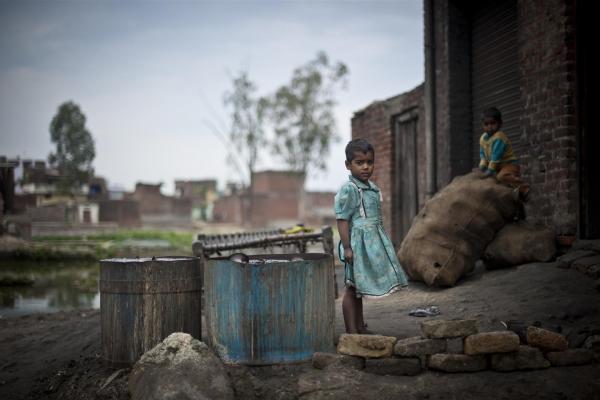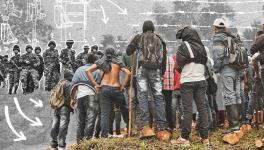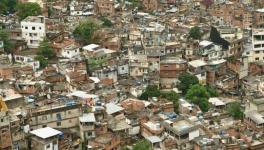360 Million South Asian Children Might Be Pushed into Poverty: UNICEF

Representational image. | Image Courtesy: Unicef
Around 360 million children from the South Asian region are likely to be pushed into poverty and food insecurity within the next six months, according to a report published by UNICEF on Tuesday, June 23. The report said, “The lives and futures of children across South Asia are being torn apart by the Covid-19 crisis. While they may be less susceptible to the virus itself, children are being profoundly affected by the fallout, including the economic and social consequences of the lockdown and other measures taken to counter the pandemic.”
It added, “Decades of progress on children’s health, education and other priorities risk being wiped out. Yet the crisis has also presented opportunities to expose and tackle some of the longstanding challenges facing children in the region, especially those from the most vulnerable communities.”
The report also pointed out that according to the newly published study by Johns Hopkins Bloomberg School of Public Health in the Lancet Global Health Journal, due to reductions in routine health service coverage levels, disruption in life-saving immunisation activities and an increase in child wasting, up to 300,000 children could die in India alone in next six months.
In the worst-case scenario, South Asia could see the additional deaths of as many as 8,81,000 children aged five or under and that of 36,000 mothers over the next 12 months, according to the report. The bulk of these deaths would occur in India and Pakistan, although Bangladesh and Afghanistan could also see significant levels of additional mortality. “The direct risk to children from the virus is much less than that from the disruption to routine health services,” said UNICEF Health Advisor for South Asia, Paul Rutter. “It is crucial that childbirth, child health and nutrition services remain available for families during the time of COVID-19.”
Of all the countless lives upended by COVID-19, those of 600 million children in South Asia are surely among those affected most profoundly, said the report. South Asia, where the pandemic is still tightening its grip, is home to roughly one quarter of the world’s population.
The report points out that for some children, being confined at home puts them in physical danger. Phone helplines are reporting more calls from children suffering violence and abuse. It added, “Some say they are struggling with depression and mental illness. Children living in camps for refugees and the displaced are having to cope without many of the services that protect them in normal times.” The report added, “But these consequences only foreshadow what is to come. A looming global recession threatens to hit South Asian economies hard, leading to surging increases in unemployment and poverty, potentially throwing the region’s broader development into reverse.”
According to a statement released by UNICEF on June 23, CHILDLINE 1098, the emergency phone service for children in need of aid and assistance in India, received 460,000 calls in 21 days from March 20 to April 10, a 50% increase from their regular call volumes. Nearly 10,000 of these were intervention cases which required CHILDLINE staff to reach the children in need of support. Of these 30% were related to escalation in violence, child sexual abuse, child marriage, and child labour. Nearly 898 child marriages were stopped by CHILDLINE during the lockdown.
The statement further added that the increase in economic distress threatens to cause a spike in child marriage, child labour and, institutionalisation of children in childcare homes (due to rural and economic distress, domestic and gender-based violence, and impoverishment). Children on the move and/or on the streets are at an increased risk of trafficking and sexual abuse and exploitation. It added, “Experience from previous health emergencies show that children are at heightened risk of exploitation, violence and abuse, including risks online, when schools are closed, social services are interrupted, and movement is restricted. For example, school closures during the Ebola outbreak in West Africa from 2014 to 2016 resulted in spikes in child labour, neglect, sexual abuse and teenage pregnancies.”
Dr Yasmin Ali Haque, UNICEF Representative in India said at the release of the report, “The pandemic has exposed the fragility of children, less by the virus itself but much more by the indirect and long-term fallout. Millions of vulnerable children are losing out on their development and learning opportunities, and their right to survive and thrive. The most vulnerable families need to be protected by shock-absorbent social protection schemes that can help them access healthcare, schooling for children, and afford nutrition and other essential services. These can only be ensured by a firm commitment from the governments and all stakeholders coming together to reimagine a better world for every child.”
Also read: The Children of Palestine
Get the latest reports & analysis with people's perspective on Protests, movements & deep analytical videos, discussions of the current affairs in your Telegram app. Subscribe to NewsClick's Telegram channel & get Real-Time updates on stories, as they get published on our website.
























